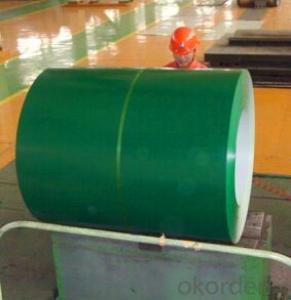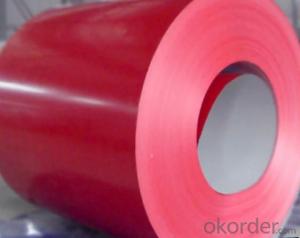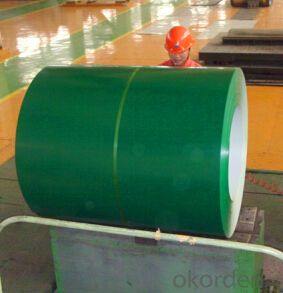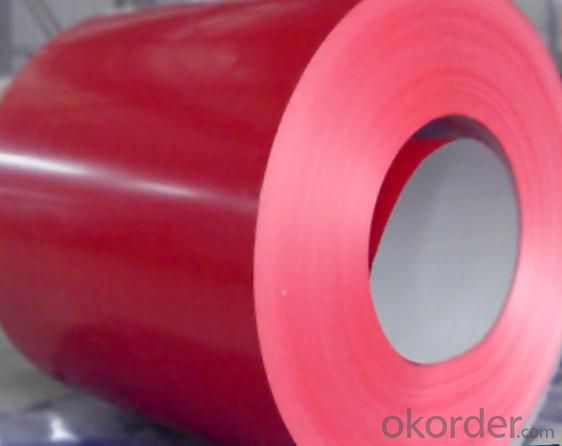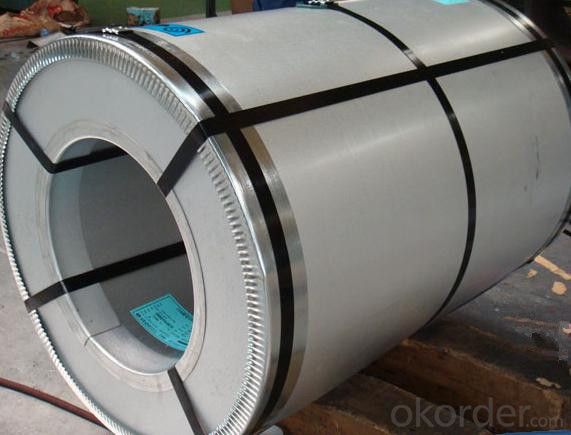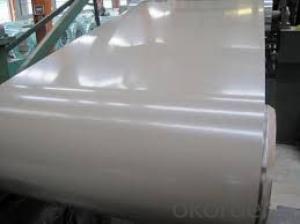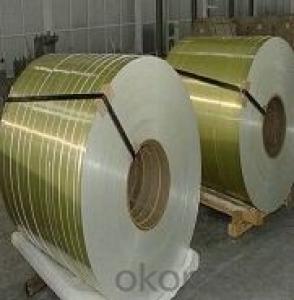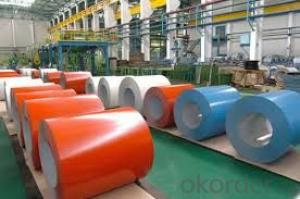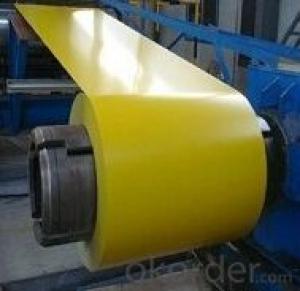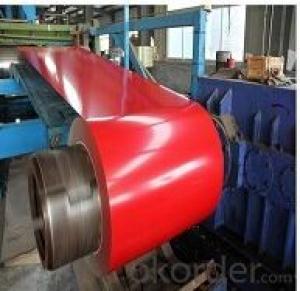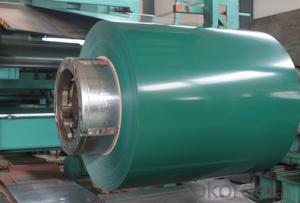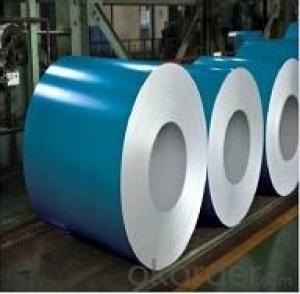0.3mm Thickness Prepainted Galvanized Steel Coil for Construction
- Loading Port:
- Shanghai
- Payment Terms:
- TT OR LC
- Min Order Qty:
- 25 m.t.
- Supply Capability:
- 10000 m.t./month
OKorder Service Pledge
OKorder Financial Service
You Might Also Like
Basic Info.
Model NO.:DX51d SGCC DX52d
Surface Treatment:Coated
Certification:ISO, SGS
Technique:Hot Dipped
Standard:ASTM, JIS, GB, AISI, DIN, BS
Application:Boiler Plate
Edge:Slit edge
Stock:Stock
Steel Grade:Dx51d
Thickness:0.3mm
Width:1250mm
Top Paint:15+5
Back Paint:5-7
ID:508mm
Coil Weight:3-8 Tons
Zinc Coating:50g-250g/Psm
Gloss:65%-80%
Feedback:Within 24 Hours
Export Markets:Global
Additional Info.
Packing:Export Standard Package or as Request
Standard:AISI, ASTM, BS, DIN, GB, JIS
HS Code:7210701000
Production Capacity:150, 000tons/Year
Product Description
Specifications:
1.Thickness: 0.12mm-1.3mm
2.Width: 600mm-1250mm
3.Length: According to client's demands
4.Top paint: 15 to 25 um (5 um + 12-20 um)
Back paint: 7 +/- 2 um
5. Gloss: Normal or High gloss
6. Zinc coating: Z50-Z275G/psm
7. Inside Diameter: 508mm/610mm
8. Outside Diameter: 1000mm-1500mm
9. Coil weight: 3-8 tons
10. Payment: T/T, L/C, D/P, Paypal, Western Union
11. Trade Term: FOB, CFR, CIF
12. MOQ: 25 Mt
13. Package: Export standard package or as request
14. Shipment: By container
15. Standard: AISI, ASTM, BS, DIN, GB, JIS
16. Grade: JIS G3322, CGLCC, ASTM A755, CS-B
Company Culture:
Take customers as the honoured, Take quality as the foundation!
Strive For Survival On The Basis Of Quality!
Why Us:
1. ISO, BV, CE, SGS approved
2. Competitive price and quality from our own factory
3. Efficient service team online for 24 hours
4. Smooth production ability(50000tons/month)
5. Quick delivery and standard exporting package
6. Flexible payment with T/T, L/C, Paypal, Kunlun bank, etc
| Name | 0.3mm Thickness PPGI Prepainted Galvanized Steel Coil |
| Resin constructure Technique of production | Double painting and double baking process |
| Productivity | 150,000Tons/year |
| Thickness | 0.12-1.3mm |
| Width | 600-1250mm |
| Coil Weight | 3-8 Tons |
| Inside Diameter | 508mm Or 610mm |
| Outside Diameter | 1000mm-1500mm |
| Zinc Coating | Z50-Z275G/psm |
| Painting | Top: 15 to 25 um (5 um + 12-20 um) back: 7 +/- 2 um |
| Standard | JIS G3322 CGLCC ASTM A755 CS-B |
| SurfSurface coating coloace coating type | PE, SMP, HDP, PVDF |
| Back side coatingcolor | Light grey, white and so on |
| Application | PPGI is featured with light-weight, good looking and anticorrosion. It can be processed directly, mainly used for construction industry, home electronic apparatus industry, electronic apparatus industry, furniture industry and transportation. |
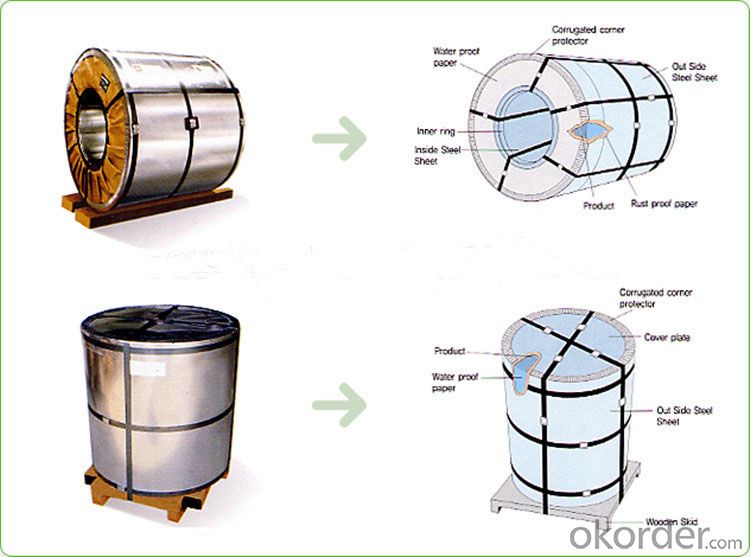
- Q: How do steel coils impact the environment?
- Steel coils can have both positive and negative impacts on the environment. On one hand, the production of steel coils requires significant amounts of energy and emits greenhouse gases, contributing to climate change. Additionally, the extraction of raw materials for steel production can lead to deforestation and habitat destruction. On the other hand, steel is highly recyclable, reducing the need for new steel production and saving energy and resources. Proper waste management and recycling practices can mitigate the negative environmental impacts of steel coils.
- Q: What are the common methods of protecting steel coils from corrosion?
- Common methods of protecting steel coils from corrosion include applying a protective coating, such as zinc or paint, using corrosion inhibitors, storing coils in a controlled environment with low humidity, and implementing proper handling and packaging techniques to prevent moisture exposure.
- Q: How are steel coils used in the manufacturing of construction cranes?
- Steel coils are used in the manufacturing of construction cranes primarily for their strength and durability. These coils are formed into various components such as beams, plates, and sections, which make up the structural framework of the crane. Additionally, steel coils are used to fabricate critical parts like the boom, jib, and counterweights, ensuring the crane's stability and lifting capacity. The high tensile strength of steel coils enables cranes to withstand heavy loads and harsh working conditions, making them essential for safe and efficient construction operations.
- Q: What is the typical weight of a steel coil?
- The typical weight of a steel coil can vary depending on several factors such as the type of steel, the thickness, and the dimensions of the coil. However, on average, steel coils can range from a few hundred kilograms to several tonnes.
- Q: Can steel coils be coated with weather-resistant materials?
- Yes, steel coils can be coated with weather-resistant materials. These coatings provide protection against corrosion, moisture, UV rays, and other environmental factors, helping to enhance the durability and longevity of the steel coils, especially when used in outdoor or exposed applications.
- Q: I am doing a experiment on mild steel soaked in sodium chlorideanyone can enlighten me about the effect of the sodium chloride in engineering term ?The mild steel specimen which I soaked in the sodium chloride has orange rust on it
- The mild steel contains a lot of Iron. The NaCl solution quickly attacks the iron content and forms rust. Over time, the solution may also cause what is called 'Chloride Cracking' of the steel. Pitting corrosion of stainless steel due to chlorides would certainly produce a rust-colored product. Passivation can be used to maintain a good corrosion resistant surface of stainless steel process vessel. There are many commercial products for this purpose. In the pharmaceutical industry, this process is often called derouging, that is to remove the buildup of iron oxides on the stainless steel process surfaces
- Q: What are the different methods of coil cutting for steel coils?
- There are several methods of coil cutting for steel coils, including slitting, shearing, and laser cutting. Slitting involves passing the coil through a set of circular blades to create multiple narrower strips. Shearing utilizes a straight blade to cut the coil into desired lengths. Laser cutting involves using a high-powered laser beam to precisely cut through the coil. Each method has its own advantages and is chosen based on the specific requirements and preferences of the manufacturer or end-user.
- Q: I am building a robot for Bots IQ. In doing so i have the option of building the the armor of my robot out of titanium or tool steel.. which would be the better option.Brief description of Bots IQ: It is a competition where 2 15lb robots go and attack each other with spinning blades, hammers or whatever is designed.
- I would have to say titanium , but in doing so I am having to assume you have access to some very serious machinery.This is because Ti is extremely difficult to work and also work hardens, which could lead to cracking and failure.The other problem is that Ti is also very hard to weld .It seems tool steel is the choice for ease of working and weldability, so unless you can buy the bits you need precut or made then I'd say tool steel,preferably something along the lines of ramax.Your other option is spring steel as this is workable and gets hardened after shaping.
- Q: How do steel coils contribute to the manufacturing of HVAC systems?
- Steel coils are used in the manufacturing of HVAC systems primarily for their strength and durability. They form the core structure of various components such as heat exchangers, condenser coils, and evaporator coils. The steel coils provide stability and support, ensuring the longevity and efficiency of HVAC systems by withstanding high temperatures, pressure, and constant use.
- Q: What are the common uses of galvanized steel coils?
- Galvanized steel coils are commonly used in various industries such as construction, automotive, and manufacturing. They are primarily used for making metal roofs, walls, and fences due to their corrosion-resistant properties. Additionally, galvanized steel coils are utilized in the production of air conditioning ducts, electrical appliances, and agricultural equipment.
Send your message to us
0.3mm Thickness Prepainted Galvanized Steel Coil for Construction
- Loading Port:
- Shanghai
- Payment Terms:
- TT OR LC
- Min Order Qty:
- 25 m.t.
- Supply Capability:
- 10000 m.t./month
OKorder Service Pledge
OKorder Financial Service
Similar products
Hot products
Hot Searches
Related keywords
